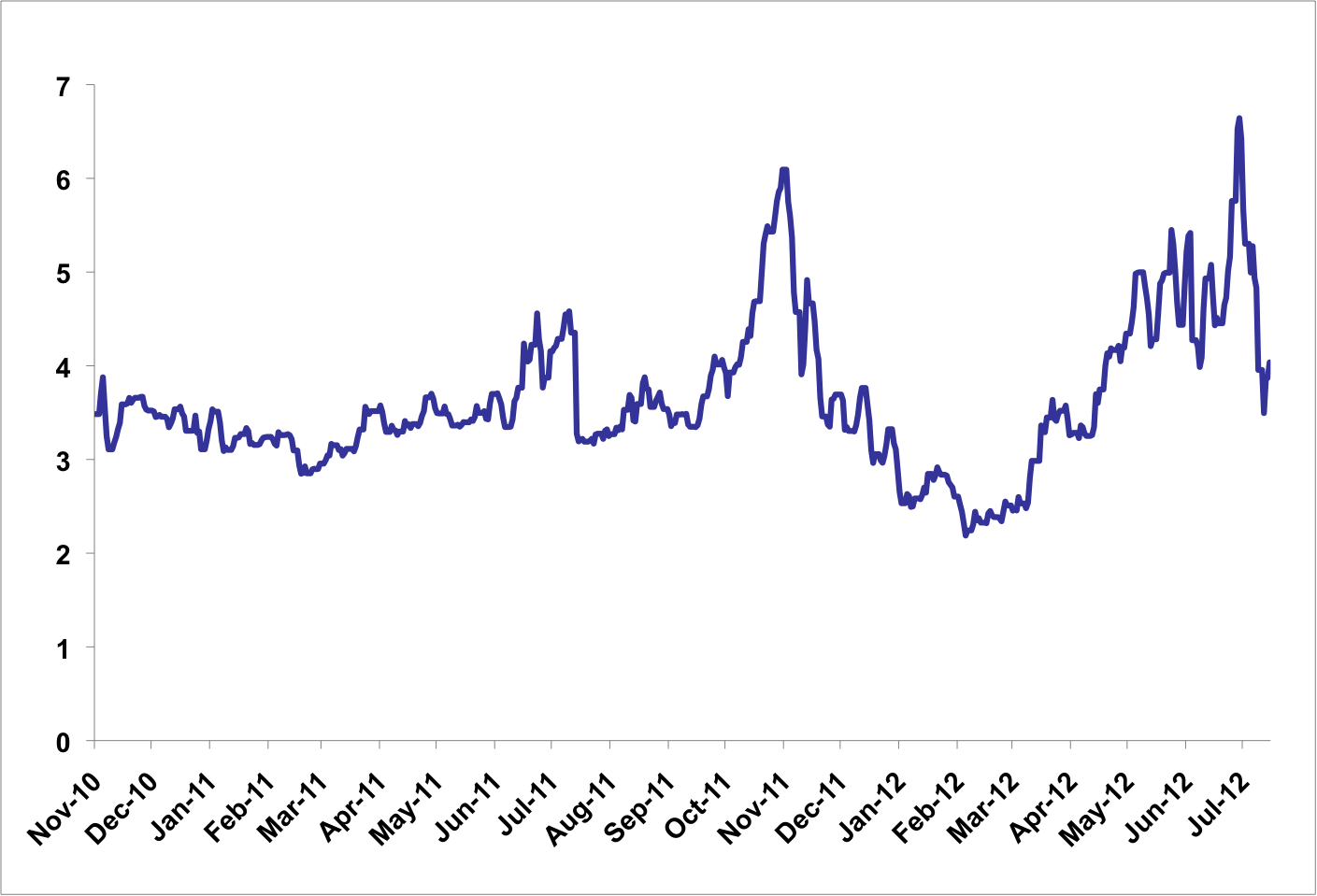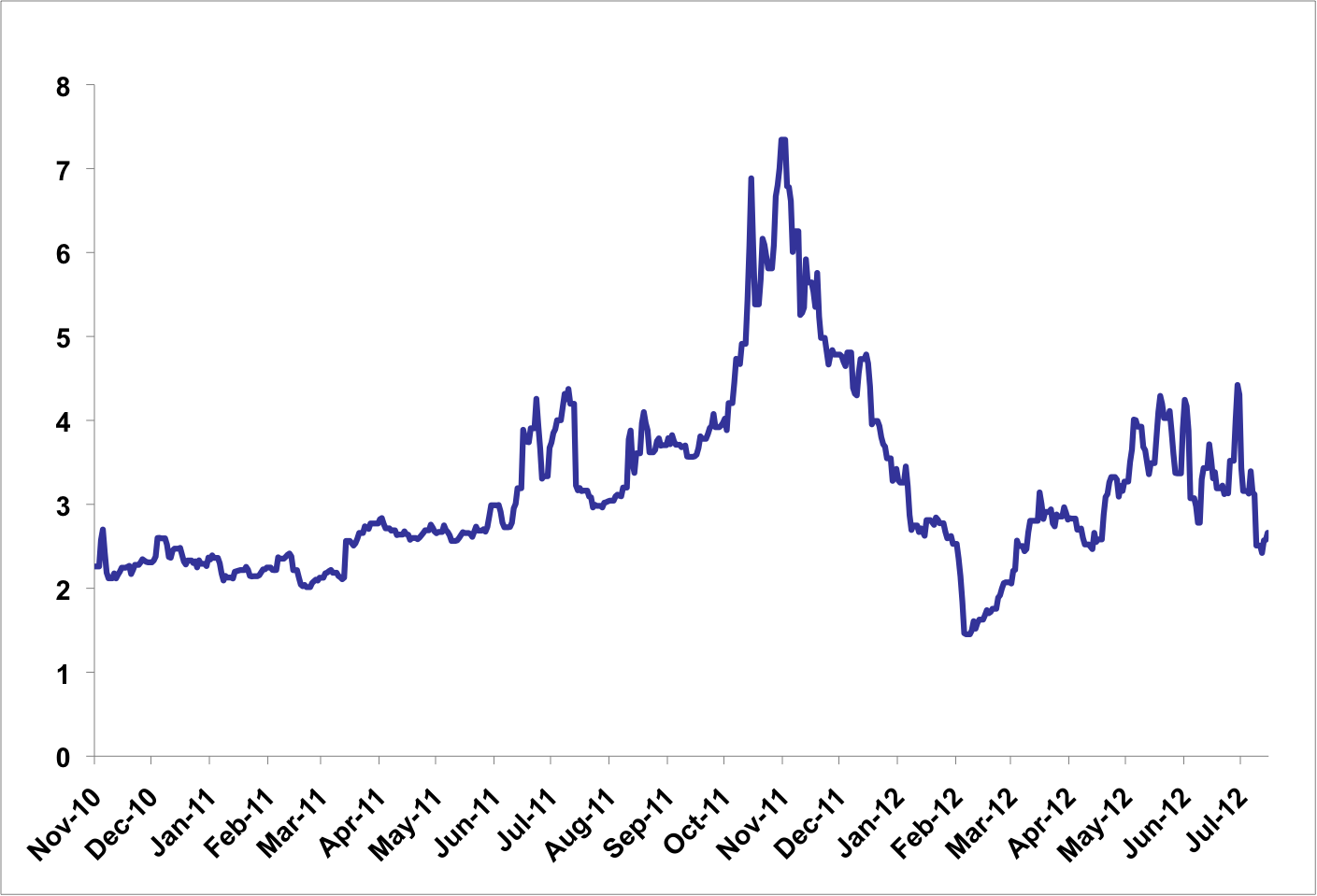Disappointment in the financial markets at Draghi’s latest press conference was predictable, understandable – and misguided. You could measure it by the movement in the euro-dollar rate, with a hopeful spike quickly followed by a despondent plunge as the press conference unfolded.
Draghi’s main messages can be summarised as follows:
- Exceptionally high risk premia on sovereign bonds, driven by fear of a euro break-up, are unacceptable and must be reversed, especially as they lead to an increasing fragmentation of the Eurozone financial markets.
- For risk premia to be compressed in a sustainable manner, governments need to make further progress on fiscal and structural reforms, to eliminate the underlying fundamental imbalances: divergences in competitiveness, in current-account balances, in fiscal trends.
- As financial markets are behind the curve in recognising progress on structural reforms, policymakers have to be ready to step in with bond purchases by the EFSF/ESM rescue funds, and possibly ECB bond purchases.
- To benefit from ECB bond buying, however, governments must accept conditionality, requesting EFSF support and signing a ‘memorandum of understanding’.
After Draghi had pledged to do “whatever it takes” in a speech in London the previous week, markets hoped the ECB would announce a new sovereign bond buying programme, with no strings attached – hence the disappointment. Instead, Draghi reiterated the ECB’s commitment to save the euro, and articulated a plan of action that matches the complexity of the challenge, and is designed to keep the Bundesbank on board. Striking the right balance is essential because otherwise the ECB’s strategy will not be sustainable; and if it is not sustainable, it will not be credible.
Markets have become increasingly concerned that the Eurozone will break up; in fact it has become almost fashionable to argue that the euro will inevitably disappear. As a consequence, we have seen a progressive fragmentation of European financial markets: the share of cross-border money market loans has decreased, non-domestic bank deposits have fallen to low levels, and “home bias” has increased, meaning that banks and other investors are tending more and more to buy only domestic financial assets. This is partly a result of market-driven spreads, partly a result of actions by policymakers and regulators, who have tried to ring-fence liquidity within national borders.
The ECB expresses absolute confidence that the euro is here to stay. Therefore, it believes this fragmentation of financial markets has to be reversed, both because it impedes the functioning of monetary policy, and because it is based on the erroneous premise that the euro’s days are numbered. And reversing the fragmentation requires reducing the spreads.
However, the ECB also recognises that the market’s concerns on the sustainability of the euro start from very real economic problems in some member countries: poor competitiveness, weak fiscal positions, large external deficits. These cannot be addressed by monetary policy. In a context where many commentators and too many economists, on both sides of the Atlantic, argue that printing money is the solution to all problems, the ECB provides an anchor of common sense. ECB action makes sense only if governments do their part. And governments cannot be trusted to act without either pressure or commitment (Alesina and Giavazzi 2012 note that Italy’s reform effort ebbs and flows with the spread on Italy’s sovereign bonds).
Therefore, ECB support will come only to countries that request EFSF help and sign up to the attached policy conditionality. Besides ensuring the sustainability of the effort, this link to conditionality should help allay the Bundesbank’s concerns on further ECB bond purchases. So should the decision to concentrate ECB purchases at the short end of the curve: this would keep them more within the realm of classic monetary policy, providing short-term respite to governments while they gain market confidence, rather than providing long-term financing of fiscal deficits. Draghi has repeated over and over that all ECB actions will be consistent with its mandate of keeping inflation low and stable. Finally, any bond purchases will be carried out with full transparency as to which bonds are being bought and in what amounts (unlike previous purchases under the Securities Market Programme), and Draghi hinted that the ECB would not seek senior creditor status, so as not to discourage private sector interest.
Figure 1. Spain two-year yields
Figure 2. Italy two-year yields
In the short term, markets will remain sceptical: ECB technical committees will now have to hammer out the details of an intervention strategy. To many investors, this will sound too much like the usual ‘Euro-routine’: big words ('whatever it takes') followed by lengthy committee discussions rather than concrete actions.
The ECB’s commitment, however, should not be underestimated. Draghi stressed that his speech in London fully reflected the ECB’s view, and that the speech was “not misinterpreted” by the markets. In other words, the ECB promised it will do whatever it takes to keep the euro alive, and this will include intervening in government bond markets. And investors seem to realise that. Some commentators accused Draghi of having botched his communication strategy, promising a lot more in London than he could deliver in Frankfurt. But Draghi’s forceful London speech was not only necessary – as short-term sovereign yields were climbing fast – it was also effective: two weeks later, Spanish two-year yields were 150 basis points lower, Italian two-year yields close to 80 basis points lower. So much for the disappointment.
The ball is now in the governments’ court. The ECB’s message to Spain and Italy is clear: stop complaining about the spreads; if you want help, ask for it, and sign on to the policy conditionality that comes with it.
References
Alesina, Alberto and Francesco Giavazzi (2012), “Il paracadute di Francoforte”, Corriere della Sera.




